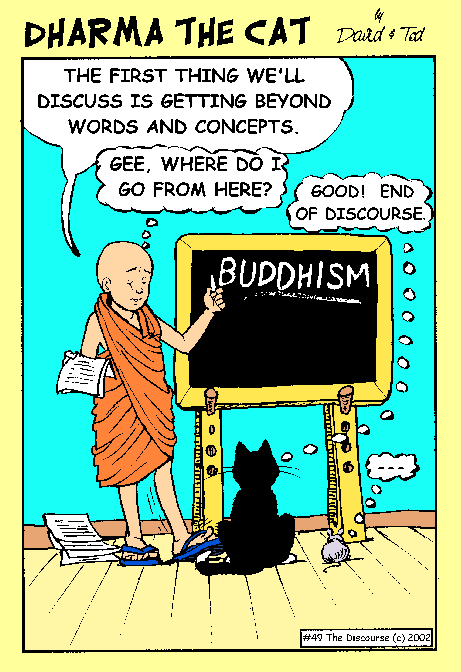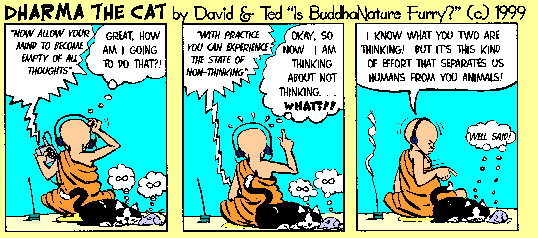Well, I have the feeling Bill Clinton delved a little into Buddhism and it did him well.
What the hell is the deal with you and Bill Clinton?
Well, I have the feeling Bill Clinton delved a little into Buddhism and it did him well.
Either buddhism claims to know exactly how the self came into existence, claims to have some speculations about it, or claims it has no idea.No. It does not take a firm stance like that concerning the metaphyical questions of existence. Neither yes nor no.
There is "The Twelve Nidānas " metaphor which LG posted. (note the numbering is arbitrary, there is no "first" link.) more at http://en.wikipedia.org/wiki/Twelve_Nidānas
The aim of the Twelve Nidānas analysis is to reveal the origins of phenomena, and the feedback loop of conditioning and causation that leads to suffering in current and future lives.
I.e. despite being about as obtruse as it is possible to be, it is supposed to be answering a pragmatic question, not a metaphysical one. Though people often spring board off it into the metaphysical deep end.
In modern terms its a root cause analysis.Its hardly surprising that LG's vedic site can't understand it a lot of Buddhists don't either.
So basically, Buddhism has no writings that explain how or why physical reality was created?
So the purpose of human is to attain enlightenment (freedom from attatchment/suffering). But it never explains what created human life, how, or why?
Other than the blanket "Seeking wisdom means you're not liberated. So being liberated means being ignorant, and not actively pursuing wisdom."
Either buddhism claims to know exactly how the self came into existence, claims to have some speculations about it, or claims it has no idea.
According to lg, Buddhism claims to know exactly how the self came into existence. And he posts this 12 nianas. It claims the self came into existence out of ignorance. What's that supposed to mean? Why?


I think a colloquial answer to "how was the physical universe created?" is that it hasn't been created and actually does not exist. What is called physicality is a product of consciousness' flaw to pursue desire and construct desirable things to satisfy the craving. So the answer to that question degenerates into another one - how was consciousness created? I have no idea how to approach that question...What is Buddhist perspective about:
How was the physical universe created?
How was the human being created?
Why?
Which Buddhist doctrines describe this?
I know nothing of buddhism nor will I ever be a buddha but props to this religion for not pretending to know the answers to the big questions,like other religions pre-tend to do.
I agree, Buddhism is to be commended for this honest attitude.So basically, Buddhism would say that it has no idea how the self came into existence or why. Great.
yes, I was wondering the same thing.What the hell is the deal with you and Bill Clinton?
Buddha taught a path to a goal...called the eightfold path to enlightenment.Moses, Jesus and Mohammed yell, "Follow me, I know the way!" Buddha tells you to find your own way, and even if you don't find it, the search will enlighten you.
BTW, it is arguable whether Buddhism satisfies the definition of a "religion," since it has no deity and its supernatural component is very slight.
Either buddhism claims to know exactly how the self came into existence, claims to have some speculations about it, or claims it has no idea.
According to lg, ...
It claims the self came into existence out of ignorance. What's that supposed to mean? Why?
Its basis is the firm affirmation of a spiritual dimension.
Originally Posted by spidergoat
What the hell is the deal with you and Bill Clinton?
yes, I was wondering the same thing.
THE MADHYAMIKA DOCTRINE IS ...
feel free to indicate how the reference doesn't get itYou know quoting people who not only don't get it, but have a vested interest in not getting it really isn't going to further your understanding.
actually its a commentary on the buddhist doctrine ... the op was asking for doctrinal references while simultaneously posing problems inherent with buddhism.LG is posting quotes from a vedic advocacy group. Do you turn to Kali for your information about xtianity?
There are various buddhists who have recorded various opinions about all the rest of that based on what they knew at the time, but none of that is really important to buddhism. Being able to drink when you are thirsty without getting side tracked in the non essential is what buddhism is concerned with.
feel free to indicate how the reference doesn't get it
Anatta. So buddhism claims that there is no inherent nature. But what about all the buddhists claiming that the nature of the self is buddha?The foundation of buddhism is: Anatta (no inherant nature, lit. no soul), anicca (imperminance) and dukkha (dissatisfaction) but its ok, most buddhists don't get it.
The eight fold path is based on sila (moral compassion), pranna (insightful wisdom) and samadhi (focused attention).
If you find "the firm affirmation of a spiritual dimension" in that, then your definition of "spiritual" works for me.
Anything which contradicts these six basic core concepts is just to get bodies in the pews so the priests can keep busy.
I do know I'd last a week, but so what? Being a monk isn't anything special. Not being a monk isn't anything special either.
once again, feel free to indicate why the summaries of buddhism, like say the cycle from avidya to jaramarana, aren't legitimate.Its painfully evident that your source is just presenting strawmen that it can knock down and therefor "disprove" buddhism. What point is there in participating in your charade?
Even if these were legitimate sources what point is there in attempting a serious discussion with you when you are consistantly disingenuos in all your dialogs?
I wonder why you even bother? Do you secretly hate the beliefs you advocate???
Whoe cares? Truth. Pursuit of knowledge of truth. The truth about how the self was created, and why.
Actually its philosophy that deals with "why" questions ..... so turning to science may not be so helpful in that regard since it doesn't have a rigorous philosophical component.Turning to religion for truth doesn't work because religion has nothing to do with it. The answers to your questions are likely found in science.
I was looking for how buddhist doctrine explains creation.
Either buddhism has an explanation or it doesn't.
Does not know how or why the self came into existence.
So the objective of the game is enlightenment.
So pre-elightenment, it is impossible to know how you (the self) came about, and why you came about.
Anatta. So buddhism claims that there is no inherent nature. But what about all the buddhists claiming that the nature of the self is buddha?
Anicca. Does anicca not apply to pre-enlightenment? Isn't the attainment of enlightenment permanent?
Dukkha. ...discomfort. ... Thus, dukkha will always be there. However, as far as I know, enlightenment is freedom from dukkha.
Insightful wisdom is easy.
Focused concentrated attention is damn near impossible for most people who have no control over their thoughts.
